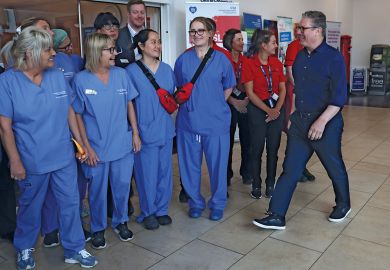The failure of educational research to have any real impact on educational practice has been lamented for many years. Today, it seems there are two broad strands of criticism of research in education.
The first, typified by retiring chief inspector of schools Chris Woodhead, is that educational research is unnecessary - we already know "what works" and teachers can learn all they need to know by watching experienced teachers or adopting prescribed curricula.
The second strand regards educational research as necessary, but of poor quality. Too often, it is said, educational research produces results that are ambiguous or contradictory, and on the few occasions when research does produce unambiguous results, these are generally felt to tell us what we already knew.
If educational researchers could only agree how to go about research properly, then educational research could join the elite club of "hard" sciences producing reliable knowledge (these people have been, in the past, rather unkindly described as suffering from "physics envy").
An Elusive Science: The Troubling History of Education Research is an account of the search, over the past hundred or so years, to try to discover how educational research might provide reliable prescriptions for the improvement of education. Through extensive use of contemporary reference material, Ellen Condliffe Lagemann shows that the search for ways of producing high-quality research has been, in effect, a search for secure disciplinary foundations. At first, philosophy and history provided those foundations, but around the turn of the century these were supplanted by psychology, although since the 1970s sociology and social anthropology have also been influential.
Lagemann argues that the failure of educational research to deliver what was wanted has arisen from three main causes: the isolation and low status of educational research in the academy; its tendency to focus too narrowly on particular aspects of education rather than looking at education systems; and the weak governance and regulation of educational research.
In the United States, teaching had been regarded as "women's work" since early in the 19th century, so educational research was accorded low status by association. Lagemann also points out that being an applied subject served to marginalise education within the academic mainstream. Educational research attempted to emulate the hard sciences through the quantification of educational processes. This entailed focusing on those aspects of education that could be easily quantified. And while most teachers were female, most school supervisors and district administrators were male, so the emerging field of educational research emphasised educational administration almost from the outset.
The School Survey movement that began around 1910 sought to gather "objective evidence" about factors influencing the educational progress of school students. But, due to the sheer diversity of the US education system, there was little agreement about the purpose or scope of education.
This lack of agreement about how to undertake educational research and what should be researched continued to plague attempts to establish "what works" over the next half-century, culminating in John F.Kennedy's reaction to the evaluation of the impact of additional money for the education of socio-economically disadvantaged students: "Do you mean that you spent a billion dollars and you don't know whether they can read or not?" In the final quarter of the 20th century, educational research finally began to get on the right track with two key realisations. First, the complexity of educational settings requires that insights from all of the "foundation disciplines" (and not just one) are required to make progress in educational improvement. Second, it slowly became clear that centre-periphery models of dissemination are simply ineffective in education. The result was a blossoming of multidisciplinary research, involving teachers in real innovation and improvement. At the same time, it seems that the politicians gave up on educational research and, by 1991, federal funding for educational research stood at approximately a third of the level provided in 1971.
Since this book focuses almost exclusively on the US, care must be taken in extrapolating messages for educational research elsewhere. However, it seems clear that the dream of educational research as a "proper science" is just that.
Educational processes are just too complex to yield simple prescriptions for change. Improvement will be messy, time-consuming and essentially local. That this is inconvenient should not delude us that it is not true.
Dylan William is professor of educational assessment, King's College, University of London.
An Elusive Science: The Troubling History of Education Research
Author - Ellen Condliffe Lagemann
ISBN - 0 226 46772 4
Publisher - University of Chicago Press
Price - £16.00
Pages - 282
Register to continue
Why register?
- Registration is free and only takes a moment
- Once registered, you can read 3 articles a month
- Sign up for our newsletter
Subscribe
Or subscribe for unlimited access to:
- Unlimited access to news, views, insights & reviews
- Digital editions
- Digital access to THE’s university and college rankings analysis
Already registered or a current subscriber?



